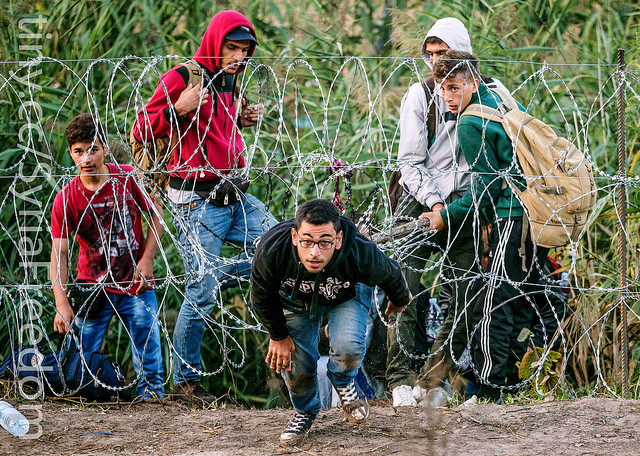ASPI suggests

The world
Donald Trump and Xi Jinping have dominated headlines as the US president is poised to hit China with new trade penalties. A podcast by Brookings claims that these tariffs will backfire, harming US businesses and America’s overall economy. The US Department of Commerce, however, argues that they won’t, and will instead protect America’s national security.
Speaking of national security, after Rex Tillerson’s dismissal last week, and following months of tension in the White House, it was only a matter of time before National Security Adviser HR McMaster threw in the towel. Politico analyses what the future looks like for the former general.
Sticking with Trumpian scandals, it has been a scorcher of a week for Cambridge Analytica—the political consulting firm that worked on Donald Trump’s 2016 presidential campaign. The New York Times and the Guardian reported last week that the firm harvested 50 million Facebook profiles without authorisation in early 2014. The Guardian also provides the low-down on who’s who and how all the key players are linked.
There are three standout pieces chronicling the repercussions of the Iraq war 15 years on. The Atlantic and Salon discuss the lessons the US should have learned from the turmoil throughout the region. And Rolling Stone suggests why we should consider 2003 as the beginning of America’s decline.
According to a recent issue of National Geographic, an estimated 143 million people will be displaced by the effects of global warming by 2050 if mitigation measures aren’t adopted. Those most affected reside in Australia’s immediate region as rising sea levels swallow entire islands in the South Pacific. Defying the UN, New Zealand is creating the world’s first visa program aimed at those fleeing climate change–induced natural disasters. Should Australia follow suit?
And then there are those who flee because they’re persecuted, and because they’re in the middle of a war. Al Jazeera has compiled 100 portraits of Rohingya children. And Der Spiegel recounts bedtime stories told in refugee camps in Turkey and Greece. These beautifully illustrated short clips convey warmth and hope while confronting the bleak reality facing displaced children in the camps.
To follow on, new research from Carnegie discusses the future for Syria’s displaced people. Kheder Khaddour argues that there should be no political settlement in Syria without including refugee return in the terms. And a thoroughly interesting piece in The Atlantic explains how German government investigators separate opportunists from sincere asylum seekers.
Just two weeks before he died, Stephen Hawking submitted what was to be his final research paper. Co‑authored with Thomas Hertog, the paper looks at the theory of a ‘multiverse’—many, many universes. It even provides a method of discovering those universes. It also goes into some detail about how our universe will end as our stars run out of energy.
Coasting into tech geek, start-up Italian car manufacturer XEV has teamed up with Polymaker, a 3D printing company, to create the world’s first mass-produced electric car, which is set to cost the consumer less than US$10,000. With a top speed of only 70 kilometres per hour and a range of roughly 150 kilometres on a single charge, the car may not be ideal for traversing the Australian countryside. But for city folk, it could be hard to beat.
Tech geek
Both China and Russia are moving rapidly to deploy hypersonic missile systems. The commander of US Strategic Command, General John Hyten, recently told Congress that the US military has no defences against such weapons. But the US is set to respond with added funding and urgency to deploy hypersonic weapons of its own. The race for Mach 5 and above is definitely on.
It’s back to the future with particle beam weapons (PBWs) in space. The US last looked at PBWs in the 1990s as part of President Ronald Reagan’s Strategic Defense Initiative (aka Star Wars). Now, space-based directed-energy weapons, including PBWs, look set to make a comeback according to Michael Griffin, US defence undersecretary of research and engineering.
There’s a fascinating short article and video on Northrop Grumman’s YF-23 Black Widow, which was the contender against Lockheed Martin’s YF-22 Raptor in a competition to be the US Air Force’s first stealth fighter.
Finally, a story that animal lovers shouldn’t read. In 1962 a bear called ‘Yogi’ got a wild ride aboard a B‑58 Hustler Mach 2 bomber when the poor thing was ejected at supersonic speed in an escape pod. He survived the experience, but later was put down for medical examination.
Podcasts
In Anatomy of Next’s latest episode, Michael Solana and guests discuss whether there might be life on Mars, or anywhere else in the universe. [39:05]
The ladies of Bombshell talk to Lindsey Ford from the Asia Society Policy Institute to discuss White House mayhem, including Tillerson, the US–North Korea presidential summit and ‘Kremlinology’. [30:00]
Videos
As the FBI continues its investigation into Russian meddling in the 2017 US presidential election, Al Jazeera’s Inside Story looks at the progress so far. [24:50]
Data scientist Christopher Wylie, the Cambridge Analytica whistleblower, is interviewed by the Guardian on his role in the saga. [13:00]
Deutsche Welle has a documentary on the history of Crimea. [42:25]
Events
Canberra, 26 March, 5.30–7.00 pm, Australian National University, Australia–USA Science and Technology Cooperation Panel Discussion, ‘Why this international partnership matters’. Register here.
Albury, New South Wales, 28 March, 9–1.30 pm, The Centre for Defence Industry Capability Seminars, ‘CDIC introduction to the Defence market’. More info and registration here.
Melbourne, 26 March, 4.30–6.30 pm, Monash University, ‘Women’s participation and recognition in sustainable agriculture livelihood in Sri Lanka’, keynote by Jacqui True followed by a panel discussion. Registration and information here.